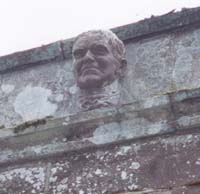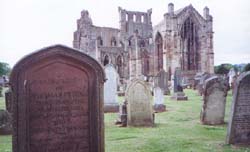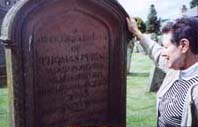

At the time of his death in 1829, Thomas PURDIE was Sir Walter Scott's wood-forester. He first came into the employ of Sir Walter Scott about June of 1804 when he was hired to superintend Scott's sheep farm at Ashestiel, situated on the southern bank of the Tweed River, a few miles from Selkirk. Scott rented this property, a house, with a small farm adjoining, from his cousin. When the lease expired in 1811, Scott purchased a farm of about 110 acres known as Cartleyhole on the right bank of the Tweed River, about 6 miles down river of Ashestiel, between Melrose and Selkirk, where the last of the great Border clan-battles had been fought between the Kers and the Scotts in 1526. Here Scott built his new home, which he named Abbotsford. Thomas PURDIE moved to Abbotsford with the Scott household on May 28, 1812. By 1825, the Abbotsford estate had increased tenfold, the result of 13 purchases. Still today, Tom Purdie's portrait, shown above, hangs on the West Wall of the Ante Room to the Armory in Abbotsford, home of
Sir Walter Scott. The portrait and was painted by Charles Robert Leslie, R.A. (1824) Abbotsford. Also, the sculpture shown below of Tom Purdie is located over the entrance to the gardens overlooking the River Tweed at Abbotsford.

Thomas PURDIE was born in 1767 in Scotland, possibly the son of Charles Purdie and Christian Turnbull. He died 29 Oct 1829 at Abbotsford in Roxburgh, Scotland, and is buried at Melrose Abbey, Melrose, Scotland. He had a brother named, Charles. He married three times: (date & place unknown)Charlotte MATHIESON; 1 Jun 1800 in Yarrow, Roxburgh, Scotland, to Mary SCOTT; 1802* in Wilton or Selkirk, Scotland, to Margaret LEGGAT. Thomas PURDIE had the following children:
*Old Parish Register Index for County of Roxburgh shows Thomas PURDIE, m. Margaret LEGGAT, 28 Nov 1802, Wilton.
Scott had now added farming to his other occupations and was compelled to learn much about the buying and selling of sheep and bullocks, the curing of sick horses and greyhounds, the catching of salmon and the punishing of poachers. 'Now though I know very little about some of these matters', he confesssed to a friend, 'yet I find it very convenient to let it be supposed I am very knowing and anxious upon the subject, although it costs me a good deal of trouble to keep up my credit.' He learnt a lot from his shepherd, TOM PURDIE, a tough, shrewd, humorous fellow who had been brought before the Sheriff on a charge of poaching. Tom's sad tale about his wife and family needing food moved Scott, while the sly addition that work was scarce but grouse plentiful amused him, with the result that TOM got off and was given work by the Shirra. It is no exaggeration to say that Scott became fonder of TOM PURDIE than of anyone else on earth. The companionship of the ex-poacher was always a relief after mixing with peers, and their intimacy provided Scott with many of those characteristic quirks with which he endowed the independent and outspoken servants who appear in his novels. The two sometimes disagreed over how things should be done; but whenever the Shirra showed by his manner that he insisted on having his own way, PURDIE would retire from the contest, returning after an interval consistent with his dignity to say that he had given the matter his careful consideration and had approved his master's decision. In course of time TOM rose to be Scott's forester, gamekeeper, librarian, and pretty well everything except cellarer, his love of whisky making him an uncertain guardian of barrels and bottles.
Although a man of exceptional placidity and toleration, Scott was very much the master of his house, the king of his castle. If he gave an order it had to be obeyed, and it was not necessary for him to give it twice. A lowering of the eyebrow was sufficient to mark his determination, and neither his children nor his servants questioned it. But he always preferred the rational way of doing things. When TOM PURDIE's wife expressed annoyance with the poor people who came to Abbotsford for assistance, Scott said to her: ' If you have nothing to give them in the way of alms, always give them civility, and for this reason: you do not know what you are to come to yourself, although you are under my roof. Just now there is no certainty either for you or me how soon we may be dismantled.' He was an indulgent master, though perhaps TOM PURDIE was the only servant who took liberties with him. TOM made it clear that to do a good day's work it was necessary to start with a reasonable dose of whisky, and Scott saw that he got it. The Waverly novels were to TOM 'our buiks', and he said that they were the greatest comfort to him, because whenever he lay awake at night he had only to start reading one of them and after two pages he was sound asleep. Though Scott confessed himself a coxcomb about his books, hating specks or spots on them, he allowed PURDIE to look after the Abbotsford library, and it was curious to see the care and neatness with which a ploughman kept the books in order. When TOM was seriously ill in 1824 his master was deeply troubled, attended to all his wants, sat by his bed, and did not leave the place until he was out of danger. 'I have almost lost my poor Sancho Panze', Scott informed a friend, '...during his delirium it was most melancholy to hear the poor fellow sometimes hunting his dogs as if he were on the hill and sometimes talking as if he were walking with me in the plantations.'
(When Sir Walter Scott was made a Baronet by George IV in 1820) The King was intelligent enough to perceive that in honouring Scott he had honoured himself: 'I shall always reflect with pleasure on Sir Walter Scott's having been the first creation of my reign', said George IV, while the person who derived the greatest satisfaction was TOM PURDIE, who celebrated the occasion by marking the back of every sheep on the Abbotsford estate with the letter 'S', placing it before the 'W.S.' already stamped on the animals.
(Later, after Sir Walter Scott suffered severe financial setbacks in 1826) They had to retrench in every direction. The servants in Castle Street were told that they must leave as they could no longer be paid. They refused to go until the house was dismantled. It was impossible to maintain a factor at Abbotsford, so William Laidlaw left Kaeside, but Sir Walter got him the job of cataloguing the large library of Scott of Hardwin. As for TOM PURDIE, 'he and I go to the grave together', said his master. Several other servants at Abbotsford, though offered more money elsewhere, remained with the family.
At the close of a day's work in October 1829, TOM PURDIE, apparently in excellent health, fell asleep at the table, and did not wake up again. It was a dreadful shock to his master, who was so fond of him that the pleasure of returning to Abbotsford was always intensified by the prospect of TOM's company and support. He unburdened himself to an old friend, Mrs Hughes, wife of a canon residentiary at St. Paul's Cathedral, London: 'I was so much accustomed to the poor fellow that I feel as if I had lost feet and hands, so ready was he always to supply the want of either. Do I wish a tree to be cut down, I miss TOM with the axe. Do I meet a bad step, and there are such things in my walks as you know, TOM's powerful arm is no more at my command. Besides all this there is another grievance. I am naturally rather shy--you laugh when I say this but it is true. I am naturally shy, though bronzed over by the practice of the law and a good deal of commerce with the world. But it is inexpressibly disagreeable to me to have all the gradations of familiarity to go through with another familiar till we are sufficiently intimate to be at ease with him.' For the first time in his life Scott was glad to leave Abbotsford for Edinburgh after the burial of TOM near Melrose Abbey. A monument was erected over the grave, and Scott had an idea for an epitaph: 'Here lies one who might have been trusted with untold gold but not with unmeasured whisky.' But the lapidary inscription was more in keeping with the surroundings.
In Chapter 4, the author tells of the first meeting Thomas PURDIE and Sir Walter Scott.
When he first examined Ashestiel, with a view to being his cousin's tenant, he thought of taking home James Hogg to superintend the sheep-farm, and keep watch over the house also during the winter. I am not able to tell exactly in what manner this proposal fell to the ground; but in truth the Sheriff had hardly been a week in possession of his new domains, before he made acquaintance with a character much better suited to his purpose than James Hogg ever could have been. I mean honest THOMAS PURDIE, his faithful servant---his affectionately devoted humble friend from this time until death parted them. TOM was first brought before him, in his capacity of Sheriff, on a charge of poaching when the poor fellow gave such a touching account of his circumstances,---a wife, and I know not how many children, depending on his exertions---work scarce and grouse abundant,---and all this with a mixture of odd sly humour,---that the Sheriff's heart was moved. TOM escaped the penalty of the law---was taken into employment as shepherd, and showed such zeal, activity, and shrewdness in that capacity, that SCOTT never had any occasion to repent of the step he soon afterwards took, in promoting him to the position which had been originally offered to James Hogg.
It was also about the same time that he took into his service as coachman PETER MATHIESON, brother-in-law to THOMAS PURDIE, another faithful servant, who never afterwards left him, and still (1848) survives his kind master.
The following description of Thomas PURDIE in Chapter 10.
Next morning there appeared at breakfast John Ballantyne, who had at this time a hunting-box a few miles off, in the vale of the Leader---and with him Mr Constable. his guest; and it being a fine clear day, as soon as Scott had read the Church service and one of Jeremy Taylor's sermons, we all sallied out, before noon, on a perambulation of his upland territories; Maida and the rest of the favourites accompanying our march. At starting we were joined by the constant henchman, TOM PURDIE---and I may save myself the trouble of any attempt to describe his appearance, for his master has given us an inimitably true one in introducing a certain personage of his Redgauntlet: 'He was, perhaps, sixty years old; yet his brow was not much furrowed, and his jet black hair was only grizzled, not whitened, by the advance of age. All his motions spoke strength unabated; and though rather undersized, he had very broad shoulders, was square made, thin-flanked, and apparently combined in his frame muscular strength and activity; the last somewhat impaired, perhaps, by years, but the first remaining in full vigour. A hard and harsh countenance; eyes far sunk under projecting eyebrows, which were grizzled like his hair; a wide mouth, furnished from ear to ear with a range of unimpaired teeth of uncommon whiteness, and a size and breadth which might have become the jaws of an ogre, completed this delightful portrait.' Equip this figure in Scott's cast-off green jacket, white hat and drab trousers; and imagine that years of kind treatment, comfort, and the honest consequence of a confidential _grieve,_ had softened away much of the hardness and harshness originally impressed on the visage by anxious penury and the sinister habits of a _black-fisher;_ ---and the TOM PURDIE of 1820 stands before us.<*>
* There is in the dining-room at Abbotsford a clever little * sketch in oil of TOM PURDIE by Edwin Landseer, R. A---who often * enjoyed TOM's company in sports both of flood and field.
As we walked homeward, Scott, being a little fatigued, laid his left hand on TOM's shoulder, and leaned heavily for support, chatting to his 'Sunday poney,' as he called the affectionate fellow, just as freely as with the rest of the party, and TOM put in his word shrewdly and manfully, and grinned and grinted whenever the joke chanced to be within his apprehension. It was easy to see that his heart swelled within him from the moment that the Sheriff got his collar in his gripe.
I must not forget, that whoever might be at Abbotsford, TOM always appeared at his master's elbow on Sunday, when dinner was over, and drank long life to the Laird and the Lady and all the good company, in a quaigh of whisky, or a tumbler of wine, according to his fancy.
Chapter 15 speaks of the death of Thomas PURDIE:
The close of the autumn was embittered by a sudden and most unexpected deprivation. Apparently in the fullest enjoyment of health and vigour, THOMAS PURDIE leaned his head one evening on the table, and dropped asleep. This was nothing uncommon in a hard-working man; and his family went and came about him for several hours, without taking any notice. When supper was ready, they tried to awaken him, and found that life had been for some time extinct. Far different from other years, Sir Walter seemed impatient to get away from Abbotsford to Edinburgh. 'I have lost,' he writes (4th November) to Cadell, 'my old and faithful servant---my factotum---and am so much shocked, that I really wish to be quit of the country and safe in town. I have this day laid him in the grave. This has prevented my answering your letters.'
The grave, close to the Abbey at Melrose, is surmounted by a modest monument, having on two sides these inscriptions---
_In grateful remembrance of the faithful and attached services of twenty-two years, and in sorrow for the loss of a humble but sincere friend; this stone was erected by Sir Walter Scott, Bart., of Abbotsford.
Here lies the body of THOMAS PURDIE, wood-forester at Abbotsford, who died 29th October 1829, aged sixty-two years.---'Thou hast been faithful over a few things, I will make thee ruler over many things._'---St Matthew, chap. xxv. ver. 21st.

